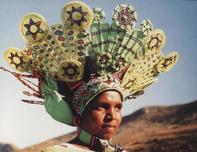No Men Allowed
Childbirth among the Zulu has always been the concern of women alone, and no men are allowed to be present at birth. Midwives are older women of the umuzi who are past child-bearing age.

After babies are born, they are washed in the umsamo - a sacred section at the back of the dwelling - with water medicated with inte/ezi 'special medicine', and then they are 'strengthened' by the observance of rituals and the application of strengthening medicines. Even today, both mothers and children are then isolated, usually until the umbilical cord falls off.
During this time the mothers are considered 'unclean' and potentially harmful to the ancestors in their husbands' homesteads. They are not allowed to touch ordinary utensils and have to eat food prepared by the midwives, out of a special dish, using a special spoon.
The isolation normally lasts five to ten days, after which the mother is purified: she has to be sprinkled with intelezi before she can resume her normal life.
The dwelling has to be thoroughly cleaned, fresh cow dung spread on the floor and a fire lit in the hearth. After this, the husband may enter and see his child for the first time, although today migrant fathers are seldom able to come home for these events. Beer is brewed to celebrate and to thank the midwives. This occasion is repeated when the father comes home from the city to meet his child.